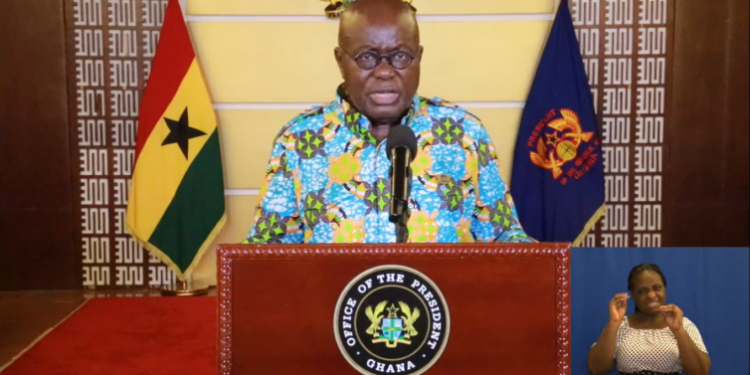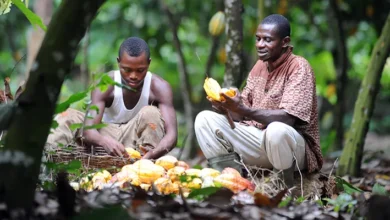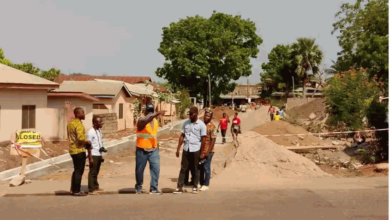
Full Text: Akufo-Addo’s 26th address on measures to deal with Covid-19 pandemic
Fellow Ghanaians, good evening.
I have not come into your homes for some time, because I had hoped that the next time I did so, I would come to announce that we were ready to lift the restrictions and protocols, and get our lives and economy back to normal. Alas, that is not the case, so it has become necessary for me to come to your homes this evening, after a ten (10) week absence, to provide you with an update on our nation’s COVID-19 situation.
As per data available from the Ghana Health Service, it appears that, unfortunately, our nation, like many others, is experiencing a third wave of COVID-19 infections.
These increased infections have largely been driven by the Delta Variant of the virus, which, according to the World Health Organisation, has increased transmissibility rates, and, in our case in Ghana, has led, in recent weeks, to a rise in hospitalisation and ICU bed uptakes, and, tragically, deaths.
Indeed, in Update No.25, the last update I rendered on 16th May, our total active case count stood at one thousand, three hundred and fourteen (1,314), with our daily infection rate standing at one hundred (100). One million, one hundred and twenty-one thousand, one hundred and sixty-eight (1,121,168) COVID tests had been conducted, out of which ninety-two thousand, four hundred and sixty (92,460) persons had been infected, ninety-one thousand, one hundred and forty-six (91,146) persons had recovered, with a total of seven hundred and eighty-three (783) deaths.
Since that update, the situation improved significantly, whereby, in June, our active cases stood at some one thousand, two hundred (1,200); our daily infection rate fell to fifty (50) cases; and we recorded ten (10) deaths in the whole of the month.
However, in recent weeks, we have seen a marked increase in the number of cases. As at Friday, 23rd July 2021, three (3) weeks later, the Ghana Health Service is now reporting that our total number of active cases stands at four thousand, five hundred and twenty-one (4,521). A total of one million, four hundred and six thousand, and eleven (1,406,011) tests have been conducted, out of which one hundred and two thousand, one hundred and three (102,103) persons have been infected with the virus, and ninety-six thousand, seven hundred and fifty-nine (96,759) persons have recovered. Our daily infection rate for the past week is three hundred and fifty (350) cases, and, sadly, forty (40) more people have died from COVID over the last ten (10) weeks, bringing the cumulative number of deaths to eight hundred and twenty-three (823) since the onset of the pandemic. Greater Accra and Greater Kumasi Metropolitan areas remain the hotspots of infections. This entire development is very alarming.
Fellow Ghanaians, it is obvious from the data that we have let our guard down, with many going about their daily duties in clear breach of and disregard for the protocols. At a time when the economy is on the rebound, and business activities picking up, we must do everything possible to contain this outbreak. We cannot afford to return to the days of partial lockdowns, which brought considerable hardships and difficulties for all of us.
You returned me to office in the elections of 7th December with a clear and decisive mandate to protect lives and livelihoods, and steer our nation out of the grips of the pandemic, and onto a path of sustained economic growth and progress. Fortunately for us, we have tried and tested response protocols which we have implemented since March 2020. They have stood us in good stead, and we have no choice but to return to the strict implementation of some of them.
It is extremely troubling to note that the high compliance rate with mask wearing has fallen alarmingly. The wearing of masks in public places, fellow Ghanaians, continues to be mandatory. There are no exceptions to this rule, and strict conformity with this protocol will be enforced. Anyone found to be flouting this directive will have him or herself to blame. We cannot afford anyone’s recklessness to endanger the lives of the majority of persons in the country.
The COVID-19 Taskforce, which I chair, has recommended that a second look be taken at the protocols that have been put in place for social and public gatherings, in particular weddings and funerals, across the country. I have, in previous updates, emphasised the need for the strict observance of safety protocols at all such gatherings. To ensure that such gatherings do not become the sources of infections, the following must be adhered to by all at these gatherings:
the wearing of masks continues to be mandatory, and persons must respect the enhanced hygiene protocols;
- all such events must be held in open air spaces;
2. the duration of such events is limited to two (2) hours;
3. there must be observance of the one (1) metre social distancing rule; and
4. handshakes must be avoided.
Furthermore, given that people sitting together to eat, drink, laugh, dance and talk in large gatherings, without masks, are the riskiest activities for spreading the virus, all post-event receptions, particularly related to weddings and funerals, are banned. I want to reiterate that protocols surrounding activities in churches and mosques remain the same, as are protocols in schools.
With workplaces currently witnessing a resurgence in COVID-19 infections, it is important that owners and management of businesses and workplaces implement strictly the guidelines on staff management and workplace protocols, such as the use of a shift system and technology, mask wearing, social distancing and hygiene protocols, as was required in the earlier days of the pandemic.
Mask wearing in commercial vehicles and in market places continue to be mandatory.
The Ghana Health Service has moved to fortify its contact tracing, testing and treating campaigns, especially across the hotspots of Greater Accra and Greater Kumasi Metropolitan areas. COVID-19 treatment centres continue to be resourced with medical supplies, personal protection equipment, and health workers.
We will continue to ensure that all arriving passengers at the Kotoka International Airport are in possession of a negative PCR test result upon their arrival in Ghana, a test which should have been conducted not more than seventy-two (72) hours before the scheduled departure from the country of origin. In addition, all passengers will continue to be subjected to a mandatory COVID test on arrival.
Fellow Ghanaians, indications are that, in the course of this quarter of the year, the availability of vaccines for our country will ramp up. Government is, therefore, standing by its commitment to vaccinate twenty million Ghanaians, i.e., the entire adult population, by the end of this year, in spite of the huge global demand for vaccines by countries, and the surge in infections the world over. So far, one million, two hundred and seventy-one thousand, three hundred and ninety-three (1,271,393) vaccine doses have been administered, with eight hundred and sixty-five thousand, four hundred and twenty-two (865,422) persons having received a single jab, and four hundred and five thousand, nine hundred and seventy-one (405,971) persons have received their full dose of two (2) jabs.
We are expecting, through the COVAX facility and the African Union, one million, two hundred and twenty-nine thousand, six hundred and seventy (1,229,670) doses of the Pfizer vaccines from the Government of the United States of America, and two hundred and forty-nine thousand (249,000) AstraZeneca vaccines from the Government of the United Kingdom. Government is also in the process of procuring seventeen million (17 million) single dose per person Johnson & Johnson vaccines, through the African Medicine Supply Platform, in this quarter.
We have, as such, upgraded our national, regional and district cold chain facilities in order to widen our access to vaccines like Pfizer and Modena, that require minus seventy degrees Celsius (-70℃) cold chains. These include sixteen (16) ultra-low cold freezers, fifty-eight (58) units of ultra-low freezers, fifty (50) normal vaccine refrigerators, three hundred (300) boxes to be filled with ice packs, three hundred (300) ice packed freezers, ten (10) cold chain vans, and one hundred and twenty (120) temperature monitoring devices. These are in addition to the existing Zipline cold chain distribution service, for which we are grateful. I thank, as well, UPS, the American multi-national shipping, receiving and supply chain management company, and Kosmos Energy, the American oil and gas company, for their generous donations towards this development.
Fellow Ghanaians, it is important to stress, once again, that all the vaccines to be used in the country have been certified as safe-for-use by our national regulatory agency, the Food and Drugs Authority (FDA). There should, therefore, be no hesitancy amongst the population who are yet to be vaccinated. As the oft-cited saying goes, it is better to be safe than sorry.
The global shortage of vaccines means that we must develop our capacity to produce our own vaccines domestically, and reduce our dependence on foreign supplies. We must be self-sufficient in this regard in the future, and prepare ourselves better to deal with any such occurrences in the future. To this end, the Committee I established, under the leadership of the world-renowned Ghanaian scientist, Professor Kwabena Frimpong Boateng, to investigate Ghana’s potential as a vaccine manufacturing hub, to meet national and regional needs, has presented its preliminary report which, amongst others, recommends the establishment of a National Vaccine Institute to spearhead this development. Government has committed to inject seed funding of some twenty-five million United States dollars (US$25 million) this year into this whole enterprise.
The Institute will be charged with delivering six clear mandates:
- establishing local vaccine manufacturing plants;
2. deepening Research & Development (R&D) for vaccines in Ghana;
3. upgrading and strengthening the FDA;
4. forging bilateral and multilateral partnerships for vaccine manufacturing in various areas, such as funding, clinical trials, technology transfer, licensing, and assignment of intellectual property rights
4. building the human resource base for vaccine discovery, development, and manufacture; and
5. establishing a permanent national secretariat to coordinate vaccine development and manufacture.
In the short term, the Frimpong-Boateng Committee is facilitating the capacity of domestic pharmaceutical companies to fill and finish COVID-19 vaccines.
Fellow Ghanaians, we must remember that the virus continues to jeopardise our lives and livelihoods. Without doubt, God has been gracious to us. I appreciate that the wearing of masks is difficult for all of us, but I entreat you to wear the mask. This is what will save us.
I ask this evening that we remain steadfast in our adherence to the protocols, so we can overcome this third-wave of infections. If we do so, we will soon be able to return to our normal way of life.
Zero active cases must remain the overarching goal, and I have no doubt that, together, and with the help of God, this too shall pass, for the Battle is still the Lord’s.
May God bless us all and our homeland Ghana, and make her great and strong.
I thank you for your attention, and good night.
Source: Myjoynews






